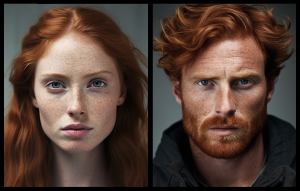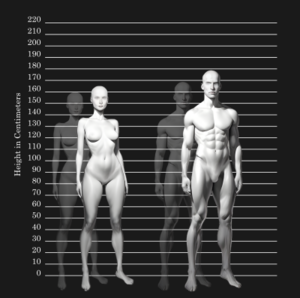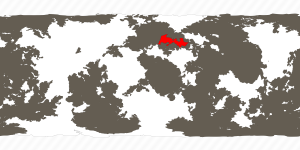Emther: Difference between revisions
No edit summary |
No edit summary |
||
| Line 14: | Line 14: | ||
| Related ethnic groups = [[ ]], [[ ]] | | Related ethnic groups = [[ ]], [[ ]] | ||
}} | }} | ||
The Emther stand out as a vibrant ethnic group native to the island of Thultannia, nestled in the northern regions of Anaria. Recognized easily by their characteristic red or fair hair and either brown or green eyes, the Emther have left an indelible mark on the regions of [[Einhafan]] and [[Halland]]. Besides these hubs, their presence has touched various corners like [[Stoldavia]], [[Auresia]], Northern Auresia, [[Anaria Major]], and the western stretches of [[Jorveh]]. Historically, their influence also extended to colonies around Gotha, reminiscent of Thultannia's erstwhile glory. | |||
== Origins == | |||
Delving into the roots of the Emther leads us to the enigmatic [[Cydhlig]] people. Covering every nook and cranny of Thultannia, the Cydhlig's journey traces back to lands like Jorveh and Stoldavia. Around 26,000BP, waves of Cydhlig migrants chose to call places like Halland and Einhafan their home. This migration was not a singular event; between 23,000BP to 7,000BP, Thultannia saw fresh faces from Anaria Major and Anaria Minor. But by 5,000BP, the Cydhlig, with their distinctive physical features, became the dominant ethnic identity. Their cultural fabric was deeply interwoven with languages showcasing common linguistic elements, all categorized under the Cydhlig language umbrella. Contemporary linguistic scholars demarcate these into three primary sub-families: East Cydhlig, South Cydhlig, and West Cydhlig. | |||
== History == | |||
The timeline around 5500RH was pivotal for the Cydhlig. Their pure lineage saw intermixing due to southern migrations and influences from the Orkanan missionaries, hailing from the Stoldavic [[Orkanan]] realm. This era, now termed the "Migration Period", witnessed a decline in migratory movements, paving the way for the Emther's emergence as a distinct ethnic identity. By 6000RH, the linguistic landscape underwent a sea change, with southern Cydhlig languages making way for newer tongues. Records from 6200RH depict a Thultannia dotted with clear territorial demarcations, representing diverse kingdoms. Fast forward to 7200RH, and Thultannia was primarily under the aegis of the Kingdom of Penrhyn and Iseldir. | |||
== Religion == | |||
[[Orkanan]] is not just a religion for the Emther; it's a way of life. This belief system, with its intricate sects and branches, forms the spiritual backbone of the Emther community. | |||
== Languages == | |||
The tapestry of languages spoken by the Emther is rich and varied. At its core lie the Cydhlig languages - the likes of Einhafanish, Islish, Camberian, and Owerogogian. However, their linguistic repertoire doesn't end here. They are also fluent in [[Achlt]] languages, notably [[Hallish]] and [[Aedelish]], and the Dragar languages, including Ardennique and [[Auresian]]. | |||
== Ethnic Relations == | |||
The modern world sees the Emther navigating a complex web of ethnic relations. Their interactions with the Du8c3b6lmer are characterized by caution, stemming from the latter's perceived dominance. The Karsk too, especially with Auresian territorial ambitions in southern Thultannia, are approached with a mix of respect and reservation. Yet, the relationship with the Aldsay from Aedeland and Jorveh shines as a beacon of mutual admiration and camaraderie. | |||
Revision as of 18:49, 19 August 2023
| Ethnic group | |||
|---|---|---|---|
 ' | |||
| Height comparison | |||

| |||
| Eye colour |
| ||
| Hair colour and type |
| ||
| Total population | |||
| Location map | |||

| |||
| Regions with significant populations | |||
| Missingflag.png?nolink&40 test Missingflag.png?nolink&40 test | |||
| Languages | |||
| Religions | |||
| Related ethnic groups | |||
| [[ ]], [[ ]] | |||
The Emther stand out as a vibrant ethnic group native to the island of Thultannia, nestled in the northern regions of Anaria. Recognized easily by their characteristic red or fair hair and either brown or green eyes, the Emther have left an indelible mark on the regions of Einhafan and Halland. Besides these hubs, their presence has touched various corners like Stoldavia, Auresia, Northern Auresia, Anaria Major, and the western stretches of Jorveh. Historically, their influence also extended to colonies around Gotha, reminiscent of Thultannia's erstwhile glory.
Origins
Delving into the roots of the Emther leads us to the enigmatic Cydhlig people. Covering every nook and cranny of Thultannia, the Cydhlig's journey traces back to lands like Jorveh and Stoldavia. Around 26,000BP, waves of Cydhlig migrants chose to call places like Halland and Einhafan their home. This migration was not a singular event; between 23,000BP to 7,000BP, Thultannia saw fresh faces from Anaria Major and Anaria Minor. But by 5,000BP, the Cydhlig, with their distinctive physical features, became the dominant ethnic identity. Their cultural fabric was deeply interwoven with languages showcasing common linguistic elements, all categorized under the Cydhlig language umbrella. Contemporary linguistic scholars demarcate these into three primary sub-families: East Cydhlig, South Cydhlig, and West Cydhlig.
History
The timeline around 5500RH was pivotal for the Cydhlig. Their pure lineage saw intermixing due to southern migrations and influences from the Orkanan missionaries, hailing from the Stoldavic Orkanan realm. This era, now termed the "Migration Period", witnessed a decline in migratory movements, paving the way for the Emther's emergence as a distinct ethnic identity. By 6000RH, the linguistic landscape underwent a sea change, with southern Cydhlig languages making way for newer tongues. Records from 6200RH depict a Thultannia dotted with clear territorial demarcations, representing diverse kingdoms. Fast forward to 7200RH, and Thultannia was primarily under the aegis of the Kingdom of Penrhyn and Iseldir.
Religion
Orkanan is not just a religion for the Emther; it's a way of life. This belief system, with its intricate sects and branches, forms the spiritual backbone of the Emther community.
Languages
The tapestry of languages spoken by the Emther is rich and varied. At its core lie the Cydhlig languages - the likes of Einhafanish, Islish, Camberian, and Owerogogian. However, their linguistic repertoire doesn't end here. They are also fluent in Achlt languages, notably Hallish and Aedelish, and the Dragar languages, including Ardennique and Auresian.
Ethnic Relations
The modern world sees the Emther navigating a complex web of ethnic relations. Their interactions with the Du8c3b6lmer are characterized by caution, stemming from the latter's perceived dominance. The Karsk too, especially with Auresian territorial ambitions in southern Thultannia, are approached with a mix of respect and reservation. Yet, the relationship with the Aldsay from Aedeland and Jorveh shines as a beacon of mutual admiration and camaraderie.